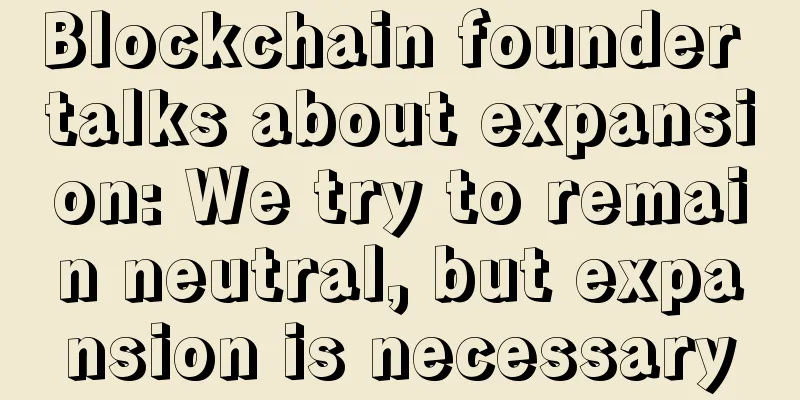|
Recently, the Chinese government website published an article titled " Blockchain: Giving You a Trustworthy World ", which stated that blockchain technology may not only change people's lives, but may even reshape the world. It also elaborated on blockchain from multiple aspects, including its technical realization, application prospects, and current development status, which has aroused widespread discussion in society. Unveiling the blockchain Blockchain is a distributed database, a string of data blocks generated using cryptographic methods. Each data block contains information about a Bitcoin network transaction, which is used to verify the validity of the information and generate the next block. Does this definition seem quite confusing? In fact, blockchain is the core technology that makes Bitcoin possible. Ant Financial Chief Architect Tong Ling described blockchain as a "public ledger": "Imagine that each node of the blockchain has a passbook, and each passbook will synchronously record every transaction that occurs on the entire network, and the same transaction will remain consistent on different passbooks. Once it occurs, it is like being printed on the passbook and cannot be tampered with."
From this point of view, the disruptive significance of blockchain technology lies in the fact that it establishes a decentralized, open and transparent trust system with technology. Blockchain CEO Zhang Shousong once said: "Since blockchain technology can become a tool for large-scale collaboration between people without the need for mutual trust, it can be applied to many traditional centralized fields to handle transactions that were originally handled by intermediaries. The biggest impact of blockchain technology in the future is the basic system of the financial industry, such as securities clearing and registration systems, cross-border exchange settlement systems, etc. These systems are centralized, expensive and inefficient. If blockchain technology can be successfully applied to these fields, even if it only saves 1% of the intermediary fees, its application prospects are quite fascinating."
Lei Yao, director of the Comprehensive Policy Research Office of the Financial Research Institute of the People's Bank of China, believes that as an important representative of financial technology, blockchain provides huge room for imagination for the development of inclusive finance. Zhou Ping, director of the Software Engineering and Evaluation Center of the Electronic Industry Standardization Research Institute of the Ministry of Industry and Information Technology, believes that the standardization and application of blockchain is the most concerned technical field at present, and may become a disruptive innovation.
What can blockchain do? What is the use of an open, transparent, and tamper-proof super-large ledger? Based on the new trust system, the main application scenarios of blockchain can be divided into two major categories: financial and non-financial.
In the financial field, from the current perspective, the "decentralization" of blockchain allows it to show its prowess in cross-border remittances. As a traditional mainstream financial telecommunications network provider, the SWIFT cross-border payment network has begun to be impacted by blockchain alliances such as Ripple and R3. Market consulting firm Accenture said in its research report: "Although it is not realistic to include all banks in a blockchain network at once, through accumulated experience and steady upgrades, blockchain will eventually change the current clearing and remittance methods."
In the view of Wang He, executive vice president of PICC Property and Casualty Company Limited, blockchain will also give insurance applications a new look. "Trust is undoubtedly the foundation of insurance, and blockchain provides trust. Insurance innovation faces three prominent and basic problems, namely trust, security and privacy. Blockchain provides new solutions to these three problems. For example, in solving underwriting risks, 'time' is the main contradiction in the operation and management of the insurance industry. Whether the accident occurs first and the insurance is purchased later, or the insurance policy is backdated, it involves time issues. The 'time stamp' technology of blockchain provides conditions for solving these problems."
In the field of credit investigation, blockchain has a broad market environment in terms of customer credit investigation and anti-fraud. "The authenticity of data on the blockchain is guaranteed, which greatly facilitates investors to directly verify the authenticity of the subject matter and also facilitates supervision. In terms of transparency and information disclosure, it can solve many platforms' violations in terms of fictitious assets and secret transactions." said Su Haide, founder of P2P platform Dianrong.com.
In the non-financial field, blockchain can also play a big role. For example, it can greatly improve the transparency of the supply chain and allow buyers to verify the true value of the products and services they purchase. British blockchain startup Provenance is providing users with a network platform that enables brands to track the origin and history of product materials, raw materials and products. Another startup Everledger's application in diamond trade is regarded as one of the most groundbreaking innovations of blockchain technology. The new system records the entire process of each diamond from the mine to the jewelry store, allowing consumers to trace the origin.
In the field of artificial intelligence, IBM has established a new division to incorporate the blockchain team into artificial intelligence and cloud computing. In IBM's view, blockchain helps artificial intelligence to achieve contract management and improve the friendliness of artificial intelligence. Another important application of blockchain is smart contracts. Based on the programmable characteristics of blockchain, people can turn contracts into codes, put them on the blockchain, and automatically execute them under agreed conditions. This is the so-called smart contract. In addition, blockchain technology is also seen as a gateway to improve the security of big data in the future. Through this technology, the ownership of big data will be clearer and the privacy of users can be truly protected.
Domestic applications are "testing the waters" Blockchain technology has become a focus of attention for policymakers around the world. In September, Fed Chair Janet Yellen revealed that the US central bank is studying blockchain technology. In October, the European Parliament think tank released a discussion paper on blockchain technology. In Asia, the Reserve Bank of India is pushing banks to develop digital currency and distributed ledger applications; the Monetary Authority of Singapore announced in November that it will launch a pilot project with the Singapore Stock Exchange and eight local and foreign banks to use blockchain technology for interbank payments, including cross-border foreign currency transactions.
In China, a recruitment notice on the official website of the central bank on November 9 showed that it hoped to find several digital currency development experts, "preferably with R&D experience related to blockchain technology." Yao Qian, deputy director of the Central Bank's Technology Department and head of the Digital Currency Research Institute's preparatory group, said: "The prototype plan for the central bank to issue legal digital currency has completed two rounds of revisions, and it is expected to be tried out first in relatively closed application scenarios such as the bill market in the future."
Judging from the market response, the domestic capital market has shown great interest in blockchain technology companies. Tang Ning, CEO of CreditEase, said that CreditEase has invested $60 million in blockchain technology company Circle. In addition, blockchain startup Matrix Finance received 150 million yuan in round A financing, Zhongxiang Bit received 50 million yuan in financing, and Bubi Blockchain received 30 million yuan in financing... "Although it will take time for blockchain technology to be widely used, this trend is irreversible. In the future, the valuation of blockchain technology will inevitably increase rapidly as the application scenarios expand. Now is the best time to invest in blockchain technology companies." Chen Jie, partner of Shanghai Gaorong Capital, said.
At the application level, from Internet giants such as BAT to banks and startups, the application scenarios of blockchain are constantly enriching. The first domestic blockchain application based on side chain, ASCH, was also released in 2016.
Ant Financial uses charity as a breakthrough. Tong Ling told me that in the past, donations could not be tracked after entering the charity project account. With blockchain technology, the life cycle of each payment can be recorded on the blockchain, allowing donors to continuously trace it.
"Blockchain can also help public welfare organizations simplify their accounting and auditing systems and complete liquidation instantly. In the future, it may be possible to open up to some auditing agencies and public welfare organizations, and as more and more organizations enter, a blockchain alliance system can be formed." Zheng Songyan, general manager of the Information Technology Department of Bank of China (Hong Kong), said that a Chinese bank and a Hong Kong bank are currently negotiating to join the Bank of China blockchain system, and blockchain technology will be applied to property valuation by January next year at the latest.
However, blockchain still needs to solve many problems in large-scale "landing" applications. Yao Qian said frankly: "The application of blockchain technology is still in the exploratory stage. The central bank will further increase the research and utilization of new innovative technologies including blockchain technology, fully foresee, respond in time, and effectively solve the risks that may arise in the application of technology." He Baohong, deputy director of the Institute of Technology and Standards of the China Academy of Information and Communications Technology, also said: "While blockchain brings advantages such as tamper-proof and decentralization, it must also pay the price of increased complexity and decreased performance. Discussions on expansion, private chains, community management rights, and the reality of hacker attacks, cross-border flows and government supervision will all become problems that blockchain must face in its "growth."
|










